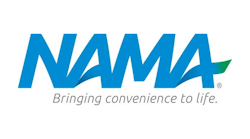For years, consumers have been told that breakfast is the most important meal of the day. It’s also a meal that people skip eating at home if they’re running late. This gives operators an opportunity to better serve their clients with a variety of breakfast options in the workplace, eliminating the need for employees to make an additional stop on the way to the office.
“Consumers are busy and often don’t take the time to eat in the morning before leaving their home,” explained Bethany Runyan Meadows, senior manager, channel marketing at Tyson Foods. “Once they have started their day, they want options that incorporate their favorite breakfast flavors and will keep them full until their next snack or meal. According to the 2017 Technomic Breakfast Consumer Report, 30 percent of consumers are purchasing breakfast fare outside of morning hours more often.”
“Breakfast is one of the biggest opportunities to grow incrementally among [operators’] consumer base,” added Andrew May, PepsiCo’s director of sales strategy, foodservice. “People are rushing out of the house to work, and with breakfast options available to them, they can save time by grabbing something at work.”
Operators interested in adding breakfast to their services or expanding their current offerings can choose from a variety of products that are available in traditional vending, micro markets and pantry service.
The rise of pantry service
Pantry service, which often accompanies office coffee service (OCS) routes and includes food and snacks that are paid for by the workplace employer, grew at a rate of 66 percent over the last two years, according to the NAMA 2018 Industry Census. The census also noted that while pantry service is the smallest segment of convenience services, it’s making gains along with micro markets and OCS, while traditional vending is expected to continue to decline.
Blake Jones, who is part of the second-generation leadership at Pot O’ Gold Coffee in the Greater Seattle area, said that Pot O’ Gold launched its pantry/snack service to a couple of its larger, 500-plus OCS accounts several years ago, making nightly snack deliveries. The graveyard-shift delivery didn’t work for the company, so it now offers pantry and snack services through its regular OCS routes. Jones reports that they’ve seen increased interest from their customers.
“It’s definitely grown,” Jones said. “The reason why is that every office — especially the tech ones around Seattle — wants to offer their employees the best they can, because they’re competing to have those employees.” Jones said that business owners don’t just want to keep these valuable employees in their workforce, they want to keep them in the office throughout the day. By offering premium coffee drinks and access to quality food, employers can eliminate the need for their employees to leave the office in search of food or beverages, increasing productivity and time spent working each day.
“They want to keep their employees happy, but they also want their employees to stay at the office,” he continued. “They don’t want them to have to leave the office and wait in line somewhere.”
Providing breakfast food in the office can actually encourage workers to show up to work earlier since they know they can get coffee and food as soon as they arrive at the office.
“[Employers] want their employees to get to the office early, so they let them know they can have breakfast there,” Jones continued. “People definitely want to have breakfast options. We’re seeing a growing demand for a lot of the breakfast items that we carry — bagels, cereals, breakfast bars, protein bars.”
Jones says that if operators notice their customers are currently providing their own breakfast items to their employees, they can capture this extra meal by offering superior inventory control, lessening the burden on whomever is responsible for ordering food and supplies for the company.
“People will go with us because of our inventory control service,” Jones explains. “If I have an account that gets snack items from us, we’ll show up prior to the delivery to take inventory, ensuring that they’re never over- or understocked. We take care of everything. There’s a growing demand of people wanting OCS to take over everything for them, because office managers don’t want to have to deal with snacks. We have accounts that we’ve had for 10 years who now want snack programs, so our warehouse is filling up with snacks.”
Breakfast in micro markets and vending
Since pantry/snack services is still a relatively small segment of convenience services — and not every employer will cover this cost for its employees — operators should also consider offering breakfast through micro markets and vending.
“Our main focus for breakfast items is in micro markets,” said May. “For some reason, breakfast items don’t do very well in vending machines. People like to look and touch these items before buying. Grab-and-go items like Cap’ n Crunch® and Aunt Jemima® Pancake On The Go are wonderful solutions.”
Vending, however, still offers consumers quick, portable and inexpensive breakfast solutions. Suppliers aren’t ignoring this part of the market segment, as snacks sell strongly in vending.
“For traditional vending, Kellogg’s heavily leans towards the snack space,” explained Melissa Ritthaler, channel marketing manager at Kellogg Company.
Ritthaler noted that PopTarts is among the brand’s “core four” products in vending, and Kellogg’s cereals and bars do well in vending.
“We do play in the breakfast space in micro markets with our Cereal-in-a-Cup and our bars,” she added. “Bars are still big in the breakfast space because people are so on-the-go and looking for that quick breakfast solution.”
The Cereal-in-a-Cup product features an adult-sized portion of cereal that can be consumed straight out of the no-spill container (milk is purchased or supplied separately). Ritthaler said that Kellogg has seen a lot of success with its Cereal-in-a-Cup Tree Merchandiser in micro markets, cafeterias and break rooms as the merchandiser can fit into a small space yet is highly visible and easily replenished.
Ritthaler said that Nutri-Grain Breakfast Bars, made with real fruit and offered in apple cinnamon, blueberry and strawberry flavors, are big sellers in vending, micro markets and pantry service. Another top seller is the Kellogg’s Special K® Protein Meal Bar, packed with 12 grams of protein and 5 grams of fiber and available in multiple flavors.
Hot and cold items prove popular
As consumers eat breakfast in the office more frequently, they’ll want more options. Operators who have the ability to provide hot or cold items in their locations can lure customers from the fast food restaurants and convenience stores they pass on the way to work. Chris Allahyar, sales for Tyson Foods, advised that operators can “compete with restaurants or convenience stores for the consumer’s business” by offering refrigerated and heated products.
“Refrigerated products that can be heated are definitely a great fit, but it needs to work for the operator’s business as well,” Allahyar explained, noting that operators should source products and packaging designed to offer simple merchandising, optimized shelf-life and performance.
Giving customers a variety of products to choose from encourages them to keep returning to the micro market or vending machine to purchase different items.
“We’re seeing that consumers want to change up what they’re eating for breakfast from day to day,” explained Craig Yoder, senior associate brand manager at Johnsonville. “We found in our research that consumers desire variety for different days of the week, and part of that is having a hot offering.”
Runyan Meadows added, “[Consumers] want the breakfast staples they love, like eggs and sausage, when it’s convenient for their schedule. We are also getting requests for innovative forms outside of sandwiches that still provide that ‘all-in-one,’ easy to eat option — bowls are an example.”
Portable, protein-forward breakfast fare like Jimmy Dean® Delights Protein Breakfast Bowls or Jimmy Dean® Simple Scrambles are easily transportable and microwavable. In addition to delivering the freshness of fast food, they can be easily incorporated into a consumer’s busy lifestyle. Jimmy Dean® also offers a French Toast & Sausage Sandwich that provides a quick, easy and satisfying meal for consumers on-the-go.
Yoder said that he’s seen an increase in operators interested in carrying Johnsonville breakfast products, especially in micro markets and vending.
“Consumers want high-quality products that are quick and easy to eat on-the-go and don’t require them to stop for very long during their busy day,” Yoder said. “Offering a convenient breakfast at onsite locations is a great way to provide nourishment at their destination.”
Johnsonville is seeing increasing interest in its Premium Handheld Sandwiches, Yoder said, which are made from high-quality ingredients and offered in a variety of unique builds and flavors. “The sandwiches are made with premium Johnsonville sausage, real eggs, cheeses and vegetables, and use on-trend bread carriers,” he said. “We introduced the Premium Handhelds almost two years ago and the response has been unbelievable. We also have simpler solutions like Stuffed Biscuits and Smoked Sausages wrapped in soft baked dough that are great for snacking.”
Operators who have the capability to serve hot breakfast foods provide maximum convenience for the consumer, yet Yoder reported strong sales on Johnsonville sandwiches, biscuits and sausages when they’re sold straight from the cooler.
“We’ve had operators sell our products cold as well as hot and ready in warmers where consumers can grab what they want and move on with their day,” Yoder said. “Our Premium Handheld Sandwiches are individually packaged and ready to heat from the refrigerator or freezer, taking less than two minutes in the microwave. The unique packaging delivers a superior product from the microwave or warmer and the bread carriers maintain their texture for up to two hours in the warmer.”
Better-for-you at breakfast
The better-for-you trend is affecting all areas of foodservice, especially breakfast.
“People want healthy, gluten-free and plant-based options, especially when it comes to protein bars,” Jones said. “We carry so many different kinds of protein bars because people will have different health criteria for that.”
Ritthaler noted that Kellogg conducted a proprietary study called “Growing Your Business Through Occasion-Based Eating and On-Trend Nutrition,” which was presented at The 2019 NAMA Show. This study — which identified 14 different eating “occasions” throughout the day including mid-morning snack, lunch alternative and afternoon snack — revealed that most consumers start the day with the intention of eating healthy, gravitating toward what they perceive as better-for-you options. Ritthaler said that popular better-for-you breakfast products noted in the study include fresh fruit, yogurt and bars.
“In this study, we found that in the mornings, people are eating healthier,” Ritthaler shared. “And then as they day goes on they are getting more indulgent in some of the choices that they’re making.”
Health-conscious consumers want to know the ingredients in the food they consume. Runyan Meadows added that consumers seek breakfast foods packed with ingredients that not only satisfy, but also energize so they feel prepared for a busy day at work.
“Consumers are looking to stay fueled throughout the entire day. Options that promise to be filling and energizing are top choice,” she said. “Consumers associate filling with high in protein, ‘meaty,’ so, better-for-you, protein-rich options are also driving breakfast trends,” she added, citing information from the Datassential Consumer Planning Program, February 2019.
Yoder concurred that proteinpacked breakfast items are very appealing to consumers.
“Our sandwiches are a good source of protein, which we know is important to breakfast consumers,” he said. “And our variety of flavors also has enough variety to satisfy every day of the week.”
For operators who aren’t sold on the amount or frequency of consumers eating breakfast in the workplace, Yoder said that people are purchasing breakfast items throughout the day.
“We’re seeing all-day breakfast continuing to trend upward,” he said. “Offering high-quality breakfast solutions like our Premium Handhelds all day long in refrigerated vending or micro markets can bring in sales beyond the breakfast daypart.”
Runyan Meadows said consumers are looking for more snacks or mini meals throughout the day, and operators are asking for products that deliver a smaller portion size, such as protein-filled breakfast items.
“Many of these asks are tied to a change in focus on better-for-you, but not based on traditional definitions of healthy — it isn’t about low-calorie or fat-free but more about protein level and portion size,” she said.
As workforce demographics continue to shift, the younger workforce of millennials — and soon, Gen Z — will certainly continue to impact breakfast trends. Ritthaler noted that the Kellogg study revealed that younger adults are more likely to look for natural and organic options, and Allahyar said he expects to see growth in products that offer better-for-you options.
May added that the changing workforce will only bring new changes to micro markets, vending, and office coffee and pantry services. “We’re seeing the consumer change,” he said.
“With boomers retiring, Millennials and Gen Z are greatly impacting the product selection.”
What’s next for breakfast?
With the rapid expansion of pantry service and the increasing popularity of breakfast in the workplace, operators should prepare for more interest in breakfast items from their customers.
“Breakfast is ripe for continued growth for operators,” May said. “Innovation is important. Consumers are always looking for new items. With so many choices, products need to be differentiated and competitively priced. We need to be creative and unique.”
With increased choices for consumers, operators need to be able to source the items their clients want.
“We have people contacting us all the time asking for snacks that we don’t have,” Jones said. “Just because we don’t have it in our product book doesn’t mean we can’t get it for them. If someone wants us to carry a new cereal or a new breakfast sandwich, we will absolutely look into it for them, and most of the time we can get it.”
For operators who haven’t yet committed time, energy and money to capturing the increasing workplace breakfast opportunity, it’s not too late to start. In convenience services, breakfast is not only the most important meal of the day, but it can also be a major revenue driver for operators.

Abby White
Abby White is a former chief editor for Automatic Merchandiser and VendingMarketWatch.com.








